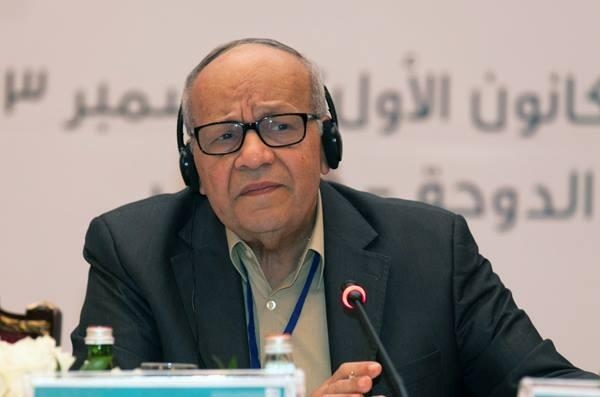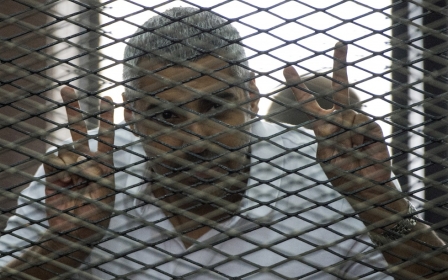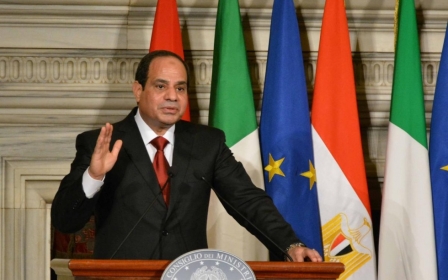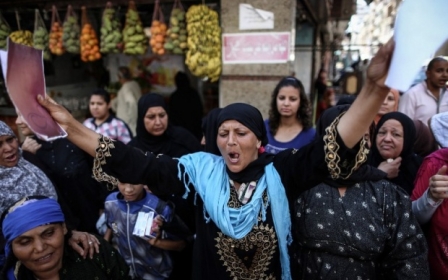Former Egyptian army commander returns after mystery disappearance

The reappearance of a well-regarded former Egyptian army commander, who was missing for two weeks, has raised fears that he was detained as a result of his opposition to the country’s rulers.
Adel Soliman, a military strategy expert and vocal critic of Egypt’s current leadership, allegedly went missing on 26 November - sources close to Soliman said he was arrested and detained by military intelligence.
On Monday, Arabic news site al-Araby al-Jadid reported that Soliman is now back at home after his 20-day disappearance - however, sources close to the family said he was suffering a "health crisis" as a result of his supposed detention.
Soliman is a retired general who led the Egyptian army’s 12th infantry division in the October 1973 war, in which an Arab coalition launched a surprise attack on Israeli forces.
The war retains great cultural resonance in Egypt today, and is memorialised as a great military triumph over a common regional foe - current president Abdel Fattah al-Sisi gave a half-hour televised speech at this year’s commemorative army parade, urging Egyptians to keep the spirit of the October war alive.
Soliman holds a PhD in strategic relations, and now heads the Egyptian thinktank Centre for Strategic Dialogue, Defence Studies and Civil-Military Relations.
A source and close colleague of Soliman told MEE that the 71-year-old was arrested at Cairo International Airport in late November, as he attempted to travel to Lebanon for a Gaza reconstruction conference in Beirut.
“They stamped his passport on exit, so it would look like he had actually left the country.
“But in fact, they prevented him from leaving Egypt. He was then arrested at his home a few hours later. Since he is a general, he was picked up by military intelligence.”
According to the source, Soliman’s family home in Cairo was raided and computers, papers and books were confiscated - his workplace at the Centre for Strategic Dialogue was also searched.
Two days later, relatives told al-Araby al-Jadid, the news site where Soliman writes a weekly column, that he had been arrested.
Denials and doubts
Egyptian authorities did not issue an official statement regarding Soliman's location - but reports of his disappearance prompted widespread rumours that he had been detained as a result of his public political statements.
Since the day of his alleged disappearance on 26 November, almost 2,000 separate Tweets have been posted about the former general.
However, a Twitter account purportedly run by his daughter Ghada issued several denials of the reports being circulated.
Translation: I am the daughter of General Adel Soliman, and the reports of my father’s arrest are incorrect. He is at his birthplace in Sohag, where there is no internet and the telephone network is weak.
Although the tweet appears to come from Soliman’s daughter, many have cast doubt on the veracity of the claim.
Residents of Sohag, a town in Upper Egypt with a population of more than five million, told al-Araby al-Jadid by telephone that communication networks in the town were working perfectly.
MEE’s sources. meanwhile, said the denial came as a result of a request from Soliman himself.
“Soliman spoke to his family by telephone on two occasions after his arrest, and told them not to go public with news of his detention - officials had promised he would be released within a day or two, and they did not want the news to leak out.”
Soliman, who sustained injuries in fighting during many of Egypt’s major foreign wars, is a prolific figure in the media and a frequent user of Twitter, sending an average of six tweets per day.
However, nothing has been posted since 26 November, the day of his feared arrest - at the time of publication, Soliman has still not returned to Twitter after returning home.
The retired army man is well known for his strong political stance against Egypt’s current leadership, and especially for his belief that the army, a much-loved institution in Egypt, should be kept separate from political affairs.
He has also previously hit out at Falcon, the Egyptian private security firm contracted to police university campuses.
In 2013, Soliman accused millionaire businessman Naguib Sawiris, then in charge of Sisi’s offices in Cairo, of running the company in partnership with high-ranking members of the army and the police force.
Sawiris hit back at Soliman, dubbing him the “Muslim Brotherhood general."
However, despite his vocal opposition to Sisi’s rule, Soliman has not publically expressed support for the now-outlawed organisation.
Shortly after Muslim Brotherhood leader Mohammed Morsi was deposed in July 2013, Soliman went on the record to deny rumours from Morsi’s supporters that his downfall was hastened by Egypt’s intelligence services, which were accused of feeding the troubled president incorrect information.
“This is an utterly bizarre allegation - the army is being accused of a lack of discipline and of breaking its own military rules.”
Middle East Eye propose une couverture et une analyse indépendantes et incomparables du Moyen-Orient, de l’Afrique du Nord et d’autres régions du monde. Pour en savoir plus sur la reprise de ce contenu et les frais qui s’appliquent, veuillez remplir ce formulaire [en anglais]. Pour en savoir plus sur MEE, cliquez ici [en anglais].




